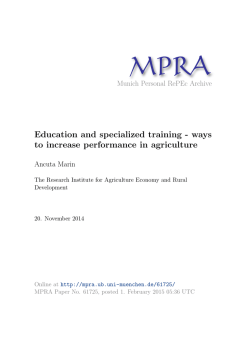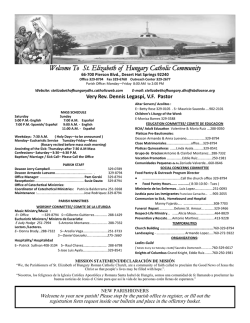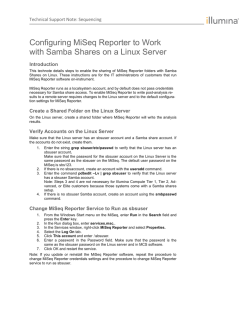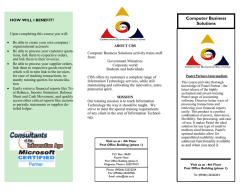
easwari engineering college, chennai
EASWARI ENGINEERING COLLEGE, CHENNAI-600 089 DEPARTMENT OF COMPUTER SCIENCE AND ENGINEERING LESSON PLAN SUBJECT CODE : CS 6401 SUBJECT TITLE : OPERATING SYSTEMS HOURS DISTRIBUTION : (L T P C 3 0 0 3) COURSE/ BRANCH : B.E. (CSE) SEMESTER : IV ACADEMIC YEAR : 2014 - 2015 FACULTY NAME : Mrs.S.SUCHITRA OBJECTIVE OF COURSE: Study the basic concepts and functions of operating systems. Understand the structure and functions of OS. Learn about Processes, Threads and Scheduling algorithms. Understand the principles of concurrency and Deadlocks. Learn various memory management schemes. Study I/O management and File systems. Learn the basics of Linux system and perform administrative tasks on Linux Servers. OUTCOME OF COURSE: At the end of the course, the student should be able to Design various Scheduling algorithms. Apply the principles of concurrency. Design deadlock, prevention and avoidance algorithms. Compare and contrast various memory management schemes. Design and Implement a prototype file systems. Perform administrative tasks on Linux Servers. 1 PREREQUISTE UNITS TOPIC NO : KNOWLEDGE IN COMPUTER ARCHITECTURE TOPIC PERIOD BOOKS PAGE NO REFERRED UNIT - I (9) OPERATING SYSTEMS OVERVIEW OBJECTIVE: To Understand The Structure And Functions of Os. 1 2 3 I 4 5 Computer System Overview-Basic Elements Instruction Execution, Interrupts, Memory Hierarchy Cache Memory, Direct Memory Access, Multiprocessor and Multicore Organization Operating system overview-objectives and functions Evolution of Operating System - Computer System Organization 1 Handout 2 Handout 3 Handout 4 T1 4–7 5 T1 7 – 19 6 Operating System Structure and Operations 6 T1 19 – 24 7 System Calls 7 T1 62 – 66 8 System Programs 8 T1 74 – 75 9 OS Generation and System Boot 9 T1 91 – 92 UNIT - II (9) PROCESS MANAGEMENT II OBJECTIVE: To Learn about Processes, Threads, Scheduling algorithms and to understand the principles of concurrency and Deadlocks. Processes-Process Concept, Process 1 10 T1 105 – 115 Scheduling Operations on Processes, 115 – 122 2 11 T1 Interprocess Communication 122 – 130 Threads- Overview, Multicore Programming, 3 12 T1 163 – 171 Multithreading Models 4 Windows 7- Thread and SMP Management 13 5 Process Synchronization - Critical Section Problem 14 T1 105 – 115 6 Mutex, Locks, Semophores, Monitors 15 T1 115 – 130 7 CPU Scheduling 16 8 CPU Scheduling 17 T1 163 – 171 2 Handout 9 Deadlocks 18 T1 115 – 130 UNIT - III (9) STORAGE MANAGEMENT OBJECTIVE: III To learn various Memory Management Schemes. 1 Main Memory - Contiguous Memory Allocation 19 T1 360 – 364 2 Segmentation, Paging 20 T1 364 – 378 3 32 and 64 bit architecture Examples 21 T1 383 – 388 4 Virtual Memory- Demand Paging 22 T1 401 – 408 5 Page Replacement 23 6 Page Replacement 24 T1 409 – 421 7 Allocation, Thrashing 25 T1 421 – 430 8 Allocating Kernel Memory 26 T1 436 – 439 9 OS Examples 27 T1 445 – 448 T1 467 – 470 T1 472 – 482 UNIT - IV (9+1) I/O SYSTEMS OBJECTIVE: TO Study I/O Management and File Systems. IV 1 Mass Storage Structure - Overview 28 2 Disk Scheduling and Management 29 3 Disk Scheduling and Management 30 4 File System Storage-File Concepts 31 T1 503 – 513 32 T1 515 – 526 528 – 538 33 T1 543 – 546 5 6 Directory and Disk Structure, Sharing and Protection File System Implementation- File System Structure 7 Directory Structure 34 T1 552 – 553 8 Allocation Methods 35 T1 553 – 561 9 Free Space Management, I/O Systems 36 T1 587 – 618 10 CBS 37 Handout UNIT - V (9+1) V CASE STUDY OBJECTIVE: To learn the basics of Linux system and perform administrative tasks on Linux Servers. 3 1 Linux System- Basic Concepts 38 Handout 2 System Administration-Requirements for Linux System Administrator 39 AR1 1–7 3 Setting up a LINUX Multifunction Server 40 AR1 8 – 31 4 Domain Name System 41 AR1 38 – 71 5 Setting Up Local Network Services 42 AR1 163 – 186 6 Virtualization- Basic Concepts 43 AR1 194 – 198 7 Setting Up Xen 44 AR1 199 – 203 8 VMware on Linux Host 45 AR1 204 – 210 9 Adding Guest OS 46 Handout 10 CBS 47 Handout ASSIGNMENT TOPICS Sl. NO ASSIGNMENT TOPICS SUBMISSION DATE 1 ASSIGNMENT PROBLEMS IN CPU SCHEDULING ALGORITHM January 29, 2015 2 ASSIGNMENT PROBLEMS IN DEADLOCKS February 16, 2015 3 ASSIGNMENT PROBLEMS IN PAGE REPLACEMENT ALGORITHM March 16, 2015 CONTENT BEYOND SYLLABUS (CBS) UNIT No TOPIC PERIOD BOOKS REFERRED 4 Introduction to Hadoop Distributed File System 1 Handout 5 Introduction to Android OS 2 Handout TEXT BOOK 1. Abraham Silberschatz, Peter Baer Galvin and Greg Gagne, “Operating System Concepts”, 9th Edition, John Wiley and Sons Inc., 2012. REFERENCES 1. William Stallings, “Operating Systems – Internals and Design Principles”, 7th Edition, Prentice Hall, 2011. 4 2. Andrew S. Tanenbaum, “Modern Operating Systems”, Second Edition, Addison Wesley, 2001. 3. Charles Crowley, “Operating Systems: A Design-Oriented Approach”, Tata McGraw Hill Education”, 1996. 4. D M Dhamdhere, “Operating Systems: A Concept-Based Approach”, Second Edition, Tata McGraw-Hill Education, 2007. 5. http://nptel.ac.in/. *ADDITIONAL REFERENCES (AR1) 1. Tom Adelstein and Bill Lubanovic, “LINUX SYSTEM ADMINISTRATION” 1st Edition, O’Reilly, 2007. 5 PROGRAMME EDUCATIONAL OBJECTIVES 1. Graduates will have sound foundation in the mathematical, scientific and engineering fundamentals, necessary to formulate, analyze and solve engineering problems. 2. Graduates will possess the ability to think logically and have capacity to understand technical problems and to design optimal solutions for a successful career in industry or academia. 3. Graduates will have the potential to apply current industry practices and technologies to analyze, design, implement, test and verify computing systems with emphasis on security to address research problems and real world challenges 4. Graduates will have the ability to work as a team in both national and multinational environments and will be able to promote the design and implementation of products and services through strong interpersonal skills, leadership quality and entrepreneurial skills. 5. Graduates will possess an urge to learn continuously and to be responsive to the demands of the progressive industrial world by carrying out researches in frontier areas of computer science and engineering. 6. Graduates will be able to provide solutions to engineering problems with an understanding of its impact on economical, environmental, ethical, and societal considerations by ensuring professional standards. PROGRAMME OUTCOMES (a-l) (a) Apply the knowledge of mathematics, science and engineering fundamentals. (b) Ability to analyze a problem, identify and define the computing requirements appropriate to its solution. (c) Ability to design, implements, and evaluate a computer-based system, process, component, or (d) (e) (f) (g) (h) (i) (j) (k) (l) program to meet desired needs. Apply the research-based knowledge and research methods to identify, formulate and solve engineering problems. Ability to use the techniques, skills, and modern engineering tools necessary for engineering practice, with an understanding of the limitations. Demonstrate understanding of the societal, health, safety, legal and cultural issues and the consequent responsibilities relevant to engineering practice. Understand the impact of professional engineering solutions in a societal and environmental context and demonstrate the need for sustainable development. Understand and commit to professional ethics and responsibilities. Function effectively as an individual, and as a member in multi-disciplinary settings. Communicate effectively with the engineering community and with society at large, such as being able to comprehend, write effective reports and design documentation, make effective presentations, and give/ receive clear instructions. Demonstrate knowledge and understanding of the engineering and management principles, and apply these to one’s own work, as a member and leader in a team, to manage projects in multidisciplinary environments. Recognize the need for, and have the ability to engage in independent and life-long learning 6 UNITS Unit –I OPERATING SYSTEMS OVERVIEW Unit –II PROCESS MANAGEMENT Unit-III STORAGE MANAGEMENT Unit –IV I/O SYSTEMS Unit –V CASE STUDY Content Beyond Syllabus COURSE OUTCOME PROGRAMME EDUCATIONAL OBJECTIVES PROGRAMME OUTCOMES 1 2 3 4 5 6 a b c d e Design various Scheduling algorithms SS SS S M M M SS SS SS MS Apply the principles of concurrency SS SS S M M M SS SS SS SS SS S M M M SS SS SS SS S M M M SS SS SS S M M M SS SS SM M M M Design deadlock, prevention and avoidance algorithms Compare and contrast various memory management schemes Design and Implement a prototype file systems f g h i M M S MS M M SS MS M SS SS MS SS SS SS SS SS SS j k l SS M SS S SS M SS M S SS M SS M M S SS M SS MS M M S SS M SS MS M M S SS M SS MAPPING OF COURSE OUTCOMES WITH PEO & THE PROGRAMME OUTCOME - OPERATING SYSTEMS (CS6401) STRONG MEDIUM WEAK 7 S M W
© Copyright 2026





